Find Help
More Items From Ergsy search
-

Common Scams to Avoid in 2025 (And How to Outsmart Them!) | Stay Safe Online
Relevance: 100%
-

Common Scams to Avoid in 2025 (And How to Outsmart Them!) | Stay Safe Online
Relevance: 87%
-

What areas of the NHS are using AI in 2024?
Relevance: 71%
-

Is the physical card still valid after 2025?
Relevance: 69%
-

Are there any new mosquito-borne diseases emerging in the UK in 2025?
Relevance: 63%
-

What are the changes for UK Driving Licenses by DVLA in 2025?
Relevance: 63%
-

What are investment scams?
Relevance: 62%
-

What is the primary change to UK Driving Licenses by DVLA in 2025?
Relevance: 61%
-
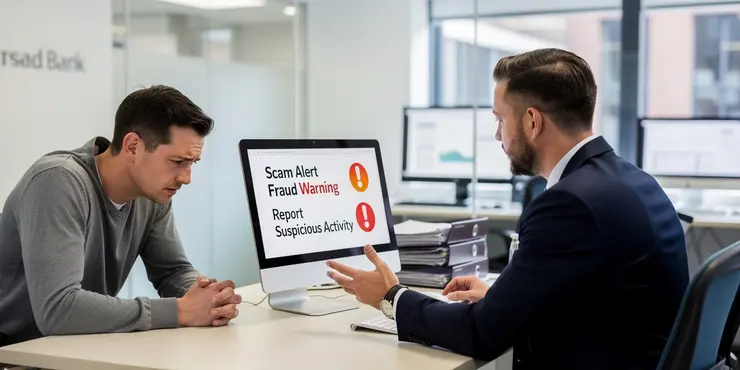
What is the IRS scam?
Relevance: 61%
-

Scams of 2024/2025 ? (Be Aware)
Relevance: 61%
-

What is a grandparent scam?
Relevance: 61%
-

What are phishing scams?
Relevance: 61%
-

How important is it to report a scam?
Relevance: 60%
-

What are the new Tenancy Law Reforms in the UK in 2025?
Relevance: 59%
-

What diseases are spread by mosquitos in the UK in 2025?
Relevance: 58%
-

What should I do if I suspect a scam?
Relevance: 58%
-

What are tech support scams?
Relevance: 58%
-

Is the Postcode Lottery a scam?
Relevance: 57%
-
Information on scams and fraud that targets the elderly.
Relevance: 57%
-

Don't Fall for These 7 Cybersecurity Scams!
Relevance: 57%
-

How do charity scams exploit the elderly?
Relevance: 56%
-

How can I recognize a scam?
Relevance: 56%
-
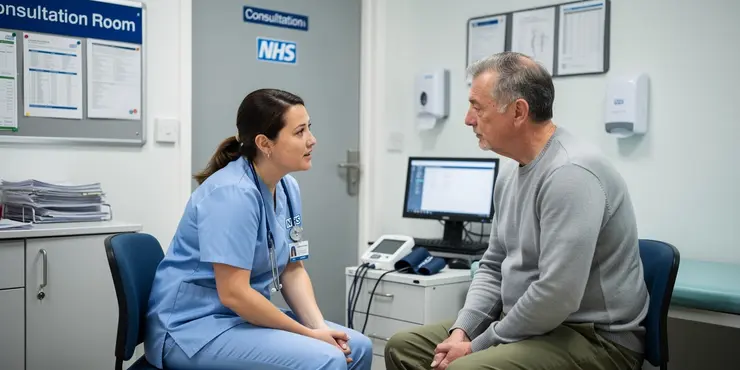
Don't Click On That Email (SPAM & SCAMS)
Relevance: 55%
-
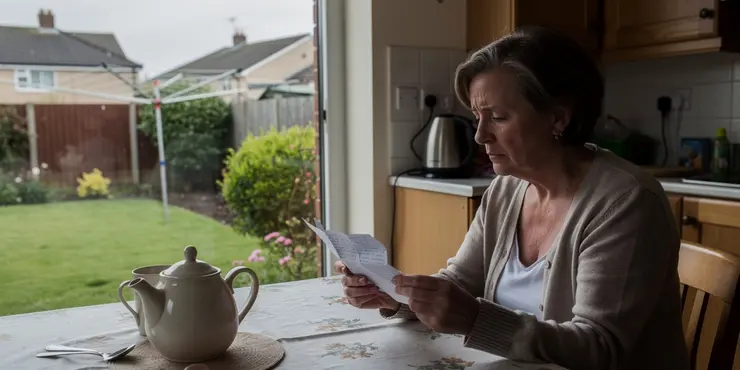
How does a lottery or sweepstakes scam work?
Relevance: 53%
-

The Most Dangerous Crypto Scam: Victims Speak Out
Relevance: 53%
-

Phishing Scams EXPOSED Don't Fall Victim to These Tricks!
Relevance: 52%
-
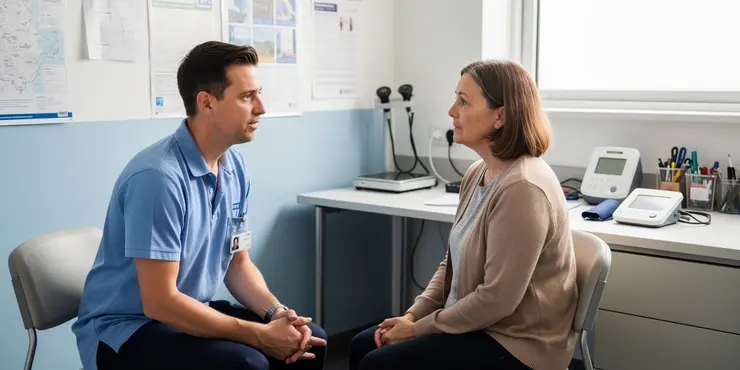
Crypto Scams Exposed - Protect Your Investments Now!
Relevance: 52%
-

How can the elderly protect themselves from scams?
Relevance: 52%
-
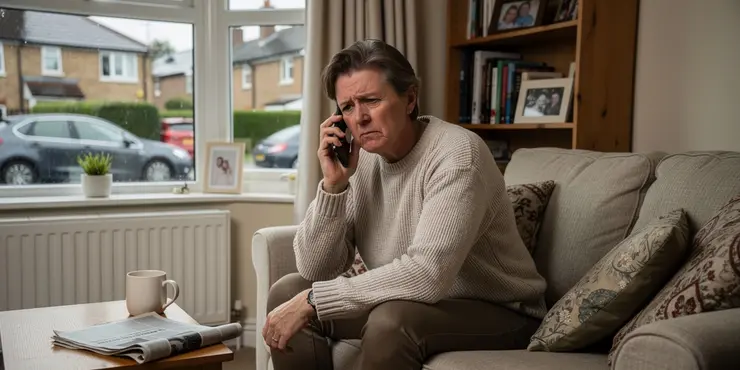
How can I deal with phone phishing scams?
Relevance: 52%
-
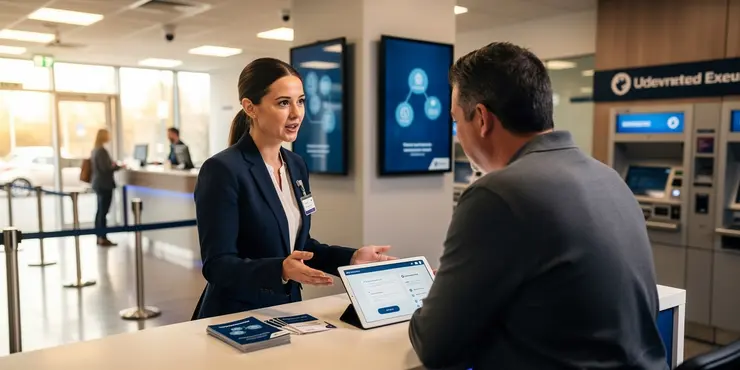
UK Banks Strengthen Security Measures Amid Rise in Online Scams
Relevance: 50%
-

What steps can I take to help an elderly loved one avoid scams?
Relevance: 49%
-

How to Spot Subscription Scams: 8 Easy Steps to Stay Safe Online!
Relevance: 47%
-

What is a phishing scam?
Relevance: 46%
-

The Devious Car Insurance Scam Hidden In Your Policy! And How to Deal With it
Relevance: 45%
-

What are common scams that target the elderly?
Relevance: 41%
-

Why do I see scam adverts on reputable sites?
Relevance: 38%
-

What are romance scams?
Relevance: 31%
-

How do scammers trick victims over the phone?
Relevance: 30%
-

Why are elder individuals often targeted by scammers?
Relevance: 30%
-

What is the key purpose of the UK Tenancy Law Reforms in 2025?
Relevance: 28%
Scams of 2024/2025: Be Aware
As technology continues to evolve, so do the methods employed by scammers. In 2024/2025, a variety of scams are emerging, targeting individuals across the United Kingdom. Being informed about these scams is crucial for protecting yourself and your finances. Here are some of the prevalent scams to watch out for in the upcoming years.
Cryptocurrency Investment Scams
The rise of cryptocurrencies has opened new doors for investors, but it has also created opportunities for fraudsters. Scammers often create fake investment platforms promising high returns in a short period. These schemes frequently involve sophisticated websites that mimic legitimate ones and even use fake testimonials to lure in investors. Always research thoroughly and verify the credibility of any cryptocurrency investment opportunity before investing.
Cost-of-Living Crisis Scams
The ongoing economic challenges have led to a surge in scams exploiting the cost-of-living crisis. Scammers pose as utility companies, government bodies, or charitable organizations offering financial assistance or discounts. They often ask for upfront payments or personal information to process the aid, only to disappear with your money or use your data for identity theft. Genuine organizations never ask for payment to provide aid.
Job Offer and Recruitment Scams
With increased remote working opportunities, job offer scams are becoming more prevalent. Fraudsters post fake job listings and conduct online interviews, eventually asking for a payment for training materials or other upfront fees. Always verify job offers through official company channels, and remember that legitimate employers do not request money from candidates during the recruitment process.
Energy and Green Deal Scams
Scammers have latched onto energy efficiency and green deal schemes, often contacting homeowners offering free evaluations or discounts for energy-efficient home upgrades. In reality, these scammers aim to extract personal or financial information under the guise of processing the deal. Always verify the identity and legitimacy of contractors or representatives offering such services.
How to Protect Yourself
To safeguard against these scams, stay vigilant and informed. Regularly check official sources for updates on new scams. Be skeptical of unsolicited communications asking for personal details or money. Use strong, unique passwords for online accounts and enable two-factor authentication where possible. Report suspicious activities to authorities promptly to help curb the spread of scams.
Scams in 2024/2025: Stay Safe
As new gadgets come out, tricksters also come up with new tricks. In 2024 and 2025, many scams are happening in the United Kingdom. It's important to know about them to keep yourself and your money safe. Here are some scams you should know about.
Fake Cryptocurrency Investments
More people are using cryptocurrencies (digital money). But some bad people trick others with fake investment websites. They promise you can make lots of money very quickly. These websites look real and even have fake good reviews. Before you put your money in any cryptocurrency, always make sure it is safe and real. Ask an adult or someone you trust for help.
Scams About Money Help
Money is tight for many families, and some scammers use this to trick people. They pretend to be from gas, electric, or government offices. They say they can help you with money but first ask you to pay or give personal information. Real organizations won’t ask for money to help you. Remember, never give your details or payment to someone you don’t trust.
Fake Job Offers
More people are working from home now. Some scammers offer fake online jobs. They do fake interviews and then ask you to pay for work materials or other things. Real jobs won’t ask you for money to get started. Always check the job offer with the real company, and talk to someone you trust if you’re unsure.
Tricks with Energy Saving Offers
Scammers also pretend to help you make your home more energy efficient. They offer free checks or discounts but really want your personal or financial details. Always check if they are who they say they are. Ask for proof and talk to someone you trust before agreeing to anything.
How to Stay Safe
To keep safe from scams, keep your eyes open and stay informed. Check trusted sources for news on new scams. Don’t trust unexpected calls or messages asking for money or details. Use strong and special passwords for your online accounts. If anything seems wrong, tell an adult or report it to the police. This helps stop scams.
Frequently Asked Questions
What are some common scams emerging in 2024/2025 in the UK?
Some of the common scams include cryptocurrency investment scams, phishing emails posing as household brands, fake online shopping websites, and phone scams pretending to be from government agencies.
How can I identify a cryptocurrency investment scam?
Be cautious of unsolicited offers, promises of high returns with little risk, and pressure to act quickly. Verify the legitimacy of the investment through official channels and regulatory bodies like the FCA.
What should I watch out for in phishing emails?
Look for poor grammar, suspicious email addresses, urgent demands for personal information, or links to unexpected websites. When in doubt, directly contact the company that supposedly sent the email.
How do scammers create fake online shopping websites?
Scammers use similar domain names, copy logos and designs from legitimate sites, and offer unbelievable discounts to lure buyers. Always research a website before purchasing, and check for reviews and secure payment methods.
What are the latest phone scams targeting UK residents?
Phone scams often involve callers pretending to be from HMRC, NHS, or other government services, demanding payments or personal information under the guise of penalties or fines.
How can I protect myself from scams?
Stay informed about common scams, verify unsolicited communications, use strong and unique passwords, and never share personal or financial information unless you are certain of the recipient's identity.
What steps should I take if I suspect I've been scammed?
Immediately contact your bank, report the scam to Action Fraud, and change any affected passwords. Monitor your financial accounts closely for any unusual activity.
Is it safe to make online purchases in 2024/2025?
Yes, but ensure you shop from reputable websites, look for secure payment methods, and avoid deals that seem too good to be true. Always check for a secure HTTPS connection.
How can I recognise a fake app in the app store?
Fake apps often have poor reviews, few downloads, and request excessive permissions. Verify the developer's credentials and always download apps from official app stores.
What is a romance scam and how can I avoid it?
A romance scam involves a scammer creating a fake online relationship to gain someone's trust and exploit them financially. Be wary of anyone who quickly professes love or asks for money.
Are there scams related to the COVID-19 pandemic still active?
Yes, scammers exploit lingering pandemic fears by offering fake cures, vaccinations, or testing kits, or posing as official agencies to steal personal information.
What is smishing and how do I defend against it?
Smishing is phishing via SMS. Avoid clicking on links from unknown numbers, verify messages with the supposed sender, and never provide personal information through text.
How do investment scams operate in 2024/2025?
Scammers promise high returns from fake investment opportunities. They often use social media or mirror legitimate investment firms. Always research and consult trusted financial advisors before investing.
Can using public Wi-Fi expose me to scams?
Yes, unsecured public Wi-Fi can be exploited by scammers to intercept personal data. Avoid conducting financial transactions or entering credentials over public Wi-Fi.
How are job scams evolving in the UK, and what should I look out for?
Job scams involve fake job postings asking for personal details or upfront fees. Beware of offers that guarantee employment without interviews or require payments for training.
What tricks are people using to scam others in the UK in 2024/2025?
There are some tricks people use to steal money. Some of these tricks are:
1. Fake Money Investments: People might lie about making money with things like Bitcoin.
2. Phishing Emails: These are fake emails that pretend to be from your favorite stores to steal your information.
3. Fake Shopping Websites: These are websites that look real but take your money and send nothing.
4. Phone Scams: Some people pretend to call from the government to trick you.
To stay safe, always check things twice. Use tools like anti-virus software and only shop on trusted websites.
How do I know if a cryptocurrency deal is a scam?
Watch out for people who offer you something without you asking, say you will make lots of money very fast, or tell you to hurry up and decide. Check if the investment is real by talking to official groups like the FCA.
What should I look for in fake emails?
Fake emails try to trick you. They might look real, but they are not. Here is what to look for:
- Check who sent the email. Is the name and address strange?
- Look for spelling mistakes or words you do not understand.
- Be careful if the email asks for your personal information or passwords.
- Do not click on links if you are unsure. They might lead to bad websites.
- If an email scares you or says you will get in trouble, it might be fake.
Here are some things to help you:
- Show the email to someone you trust and ask if it looks real.
- Use spell-check tools to find mistakes.
- Security software can help protect your computer.
Stay safe and double-check emails that seem strange!
Watch out for bad grammar, strange email addresses, and messages asking for personal info right away. Be careful with links to websites you don't know. If you're not sure, talk to the company that sent the email.
How do bad people make fake online shopping websites?
Sometimes, bad people try to trick others by making websites that look real but are fake. These websites pretend to sell things like toys or clothes.
The bad people might use pictures and logos that look just like real ones. They do this to make you believe their website is safe.
If you visit one of these fake websites, you could lose your money or your personal information.
Here are some tips to stay safe:
- Check the website name and see if it looks a little different from the real one.
- Look for spelling mistakes or bad pictures on the website.
- Use tools like website checkers or ask a grown-up to help you make sure the website is real.
Bad people try to trick you online. They make fake websites that look like real ones. They use similar names, copy logos, and make their pages look nice. They also say they have big discounts to make you want to buy stuff.
Before you buy something, check the website first. Look for reviews from other people. Make sure the website has safe ways to pay.
What are the new phone tricks trying to fool people in the UK?
Sometimes, people might call you and pretend to be from places like the HMRC or NHS. They could say they need money or your personal details because of a fine or a penalty.
How can I stay safe from tricks?
Learn about common tricks. Check messages that you didn't ask for. Use strong and different passwords. Never share your personal or money details unless you are sure who you are sharing them with.
What should I do if I think I've been tricked?
Call your bank right away. Tell Action Fraud about the scam. Change your passwords if the scam affects them. Check your money accounts often to see if anything strange happens.
Is it safe to shop online in 2024/2025?
Shopping online can be safe if you are careful. Here are some tips:
- Use a strong password for your accounts. A strong password has letters, numbers, and symbols.
- Shop on websites that you trust. Look for a padlock symbol in the address bar—this means the site is secure.
- Use a credit card instead of a debit card when you can. Credit cards often have better fraud protection.
- Keep your computer and phone updated with the latest security software.
If you need help shopping online, ask a friend or family member, or use a browser extension that helps protect your information.
Yes, you can shop online, but be careful. Use websites that people trust. Look for safe ways to pay, like using a credit card. If a deal looks too cheap, it might not be real. Check if the website starts with HTTPS to know it’s safe.
How can I tell if an app in the app store is fake?
Want to know if an app is fake or real? Here are some easy tips:
- Check the Name: Look at the app's name. Does it have spelling mistakes?
- Read Reviews: What do other people say? Are there lots of bad reviews?
- Look at the Logo: Is the picture clear and correct? Or does it look strange?
- Check the Developer: Who made the app? Is it from a trusted company?
- Number of Downloads: Popular apps usually have many downloads. Is this app popular?
You can get help from a grown-up if you are not sure.
Bad apps can have bad reviews and not many people download them. These apps might ask for too much access to your phone. Check who made the app and only get apps from the real app store.
What is a Love Trick and How Can I Stay Safe?
A love trick is when someone pretends to love you to take your money. They might say nice things and ask for gifts or money.
Here is how you can stay safe:
- Be careful if you talk to someone new online.
- If they ask for money, say no.
- Talk to someone you trust if you feel unsure.
- Use tools like screen readers to help you read information easily.
A romance scam is when someone pretends to be your boyfriend or girlfriend online. They do this to trick you and take your money. Be careful if someone says "I love you" too soon or asks you for money.
Are there tricks about COVID-19 happening now?
Yes, some people are still trying to trick others about COVID-19. Be careful with phone calls, emails, or messages from people you don't know. They might ask for money or personal info.
To stay safe, you can:
- Ignore messages from strangers.
- Ask an adult for help if you are unsure.
- Use tools like antivirus software to protect your computer or phone.
Yes, bad people try to trick others by using leftover COVID-19 fears. They sell fake medicine, shots, or tests. Sometimes they pretend to be from important places to take your personal information.
What is smishing and how can I stay safe from it?
Smishing is when bad people try to trick you with text messages. They want to steal your information.
Here are some ways to stay safe:
- Don't click links: If you get a message from someone you don't know, don't click any links.
- Be careful with personal info: Don't share your passwords or other important information in a text.
- Use a spam filter: Some phones have tools to block bad messages. Ask an adult to help turn it on.
- Tell an adult: If you get a strange message, show it to an adult you trust.
Smishing is a trick using text messages. Do not click on links from numbers you do not know. Check the message with the person you think sent it. Never give out personal information in a text.
How do tricksters cheat people with fake investments in 2024/2025?
Tricksters are people who lie to get your money. They might pretend they have a great investment to trick you.
Here is how they might cheat you:
- Fake Promises: They may promise huge returns on your money. But this is not true.
- Pressure to Act Quickly: They will often rush you to decide quickly. This way, you don’t have time to think or ask someone for advice.
- Complicated Words: They use big, confusing words to make you feel like you can trust them because they sound smart.
- Fake Testimonials: They may show fake stories from people who say they got rich.
How to protect yourself:
- Always ask questions if you do not understand.
- Talk to someone you trust like a family member or friend.
- Use tools like speaking to a financial advisor or using websites that check if investments are real.
Scammers are bad people who lie about making money. They promise you a lot of money if you give them your money. They use websites like Facebook to fool you or pretend to be real companies.
Always check carefully before you give your money. Talk to someone you trust, like a parent or a money expert, before investing your money.
Is it safe to use public Wi-Fi?
Public Wi-Fi might not be safe. Bad people can see what you are doing online.
To stay safe, try these things:
- Use a VPN. It keeps your online activity secret.
- Do not share personal information like passwords.
- Use websites that start with "https" for extra safety.
- Turn off sharing on your device.
Ask an adult for help if you are not sure.
Yes, using public Wi-Fi that is not secure can be risky. Bad people, called scammers, can try to steal your personal information.
Don't do money things or type in your passwords when using public Wi-Fi.
Here are some tips to stay safe:
- Wait until you are on a safe, private network to do important things online.
- Use passwords that are hard to guess.
- Ask a grown-up if you need help with staying safe online.
How are job scams changing in the UK, and what should I watch for?
Job scams are tricks people use to steal your money. These tricks are changing and getting harder to spot.
Here are some things to watch for:
- If a job asks you to pay money before you start, it might be a scam.
- If a job sounds too good to be true, be careful. It might be a trick.
- If someone wants your personal information, like your bank details, be careful.
Ask a trusted adult for help if you are unsure. You can also use a tool like a spelling and grammar checker to help you understand the job ad better.
Job scams are fake job offers. They might ask you for money or your personal information. Be careful of jobs that promise you work without an interview or ask you to pay for training.
Useful Links
This website offers general information and is not a substitute for professional advice.
Always seek guidance from qualified professionals.
If you have any medical concerns or need urgent help, contact a healthcare professional or emergency services immediately.
Some of this content was generated with AI assistance. We’ve done our best to keep it accurate, helpful, and human-friendly.
- Ergsy carfully checks the information in the videos we provide here.
- Videos shown by Youtube after a video has completed, have NOT been reviewed by ERGSY.
- To view, click the arrow in centre of video.
- Most of the videos you find here will have subtitles and/or closed captions available.
- You may need to turn these on, and choose your preferred language.
- Go to the video you'd like to watch.
- If closed captions (CC) are available, settings will be visible on the bottom right of the video player.
- To turn on Captions, click settings .
- To turn off Captions, click settings again.
More Items From Ergsy search
-

Common Scams to Avoid in 2025 (And How to Outsmart Them!) | Stay Safe Online
Relevance: 100%
-

Common Scams to Avoid in 2025 (And How to Outsmart Them!) | Stay Safe Online
Relevance: 87%
-

What areas of the NHS are using AI in 2024?
Relevance: 71%
-

Is the physical card still valid after 2025?
Relevance: 69%
-

Are there any new mosquito-borne diseases emerging in the UK in 2025?
Relevance: 63%
-

What are the changes for UK Driving Licenses by DVLA in 2025?
Relevance: 63%
-

What are investment scams?
Relevance: 62%
-

What is the primary change to UK Driving Licenses by DVLA in 2025?
Relevance: 61%
-

What is the IRS scam?
Relevance: 61%
-

Scams of 2024/2025 ? (Be Aware)
Relevance: 61%
-

What is a grandparent scam?
Relevance: 61%
-

What are phishing scams?
Relevance: 61%
-

How important is it to report a scam?
Relevance: 60%
-

What are the new Tenancy Law Reforms in the UK in 2025?
Relevance: 59%
-

What diseases are spread by mosquitos in the UK in 2025?
Relevance: 58%
-

What should I do if I suspect a scam?
Relevance: 58%
-

What are tech support scams?
Relevance: 58%
-

Is the Postcode Lottery a scam?
Relevance: 57%
-
Information on scams and fraud that targets the elderly.
Relevance: 57%
-

Don't Fall for These 7 Cybersecurity Scams!
Relevance: 57%
-

How do charity scams exploit the elderly?
Relevance: 56%
-

How can I recognize a scam?
Relevance: 56%
-

Don't Click On That Email (SPAM & SCAMS)
Relevance: 55%
-

How does a lottery or sweepstakes scam work?
Relevance: 53%
-

The Most Dangerous Crypto Scam: Victims Speak Out
Relevance: 53%
-

Phishing Scams EXPOSED Don't Fall Victim to These Tricks!
Relevance: 52%
-

Crypto Scams Exposed - Protect Your Investments Now!
Relevance: 52%
-

How can the elderly protect themselves from scams?
Relevance: 52%
-

How can I deal with phone phishing scams?
Relevance: 52%
-

UK Banks Strengthen Security Measures Amid Rise in Online Scams
Relevance: 50%
-

What steps can I take to help an elderly loved one avoid scams?
Relevance: 49%
-

How to Spot Subscription Scams: 8 Easy Steps to Stay Safe Online!
Relevance: 47%
-

What is a phishing scam?
Relevance: 46%
-

The Devious Car Insurance Scam Hidden In Your Policy! And How to Deal With it
Relevance: 45%
-

What are common scams that target the elderly?
Relevance: 41%
-

Why do I see scam adverts on reputable sites?
Relevance: 38%
-

What are romance scams?
Relevance: 31%
-

How do scammers trick victims over the phone?
Relevance: 30%
-

Why are elder individuals often targeted by scammers?
Relevance: 30%
-

What is the key purpose of the UK Tenancy Law Reforms in 2025?
Relevance: 28%


